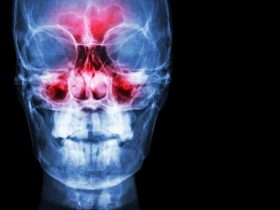At the recent American Rhinologic Society Meeting in Philadelphia (Sep 9-10, 2022), a research team from Thomas Jefferson University presented their study in a poster titled “Outcomes of Dupilumab treatment in patients presenting with severe asthma or CRSwNP, over 65”. The study demonstrated that treatment with Dupilumab in patients over 65 years of age suffering from Asthma, chronic rhinosinusitis with polyps, or both improved disease symptoms significantly after nine months of treatment.
Asthma causes dyspnea, coughing, and chest tightness and is caused by inflammation of the airways that causes the bronchi to narrow. Rhinosinusitis occurs when there is inflammation of the mucosa of the airways and sinuses. It is associated with symptoms that include nasal congestion, loss of smell, and nasal discharge -rhinorrhea. About 300 million people worldwide have Asthma. In the United States alone, the cost of Asthma is estimated to be between $ 53-56 Billion in 2022.
Dupilumab is an inhibitor used in treating Asthma and Chronic Rhinosinusitis with Nasal Polyps (CRSwNP). The objective of the study was to determine the long-term benefits of Dupilumab and its associated adverse effects in patients over age 65. It is important to determine the long-term benefits of Dupilumab and associated adverse effects in patients older than 65 years, as the safety and efficacy of Dupilumab in this age group had not been reported until now.
The research team conducted a single institutional retrospective review of patient data from the Department of Pneumology, Thomas Jefferson University. The study included adult patients over 65 receiving Dupilumab for treating severe Asthma or CRSwNP between Jan 2018 and Jul 2022. The primary outcomes were polyp scores, Sino Nasal Outcomes Test (SNOT-22) scores, Asthma Control Test (ACT) scores, and adverse effects, including ophthalmologic, dermatologic, musculoskeletal, hair loss, tinnitus, lower extremity edema, and TMJ pain.
Demographic information of the patients included:
- The mean age of the patients was 72.2 years.
- Of the 31 patients, 18 were female, and 13 were male.
- Twelve patients had severe Asthma, 7 had chronic rhinosinusitis with polyps, and the other 12 had both.
The results of their study revealed that the patients showed significant improvement in the Asthma and CRSwNP symptoms with regards to the ACT, SNOT, and polyp scores within nine months of therapy initiation. There was a significant change in ACT mean from +2.5 to 17.8 before Dupilumab treatment and to 20.3 after treatment which showed a well-controlled Asthma state. Also, the mean polyp and SNOT scores increased considerably from -1.71 to 4.46 and -29.84 to 21.67, respectively. The study also reported that the majority of patients (77%) did not experience any side effects, while 9% of patients decided to discontinue the treatment. Some limitations of the study include the small sample size and identifying the real incidence of adverse events. Finally, the authors shed light on the future directions on how Omalizumab and Mepolizumab can be compared with Dupilumab regarding functional outcomes and adverse events in patients aged 65 or older.



